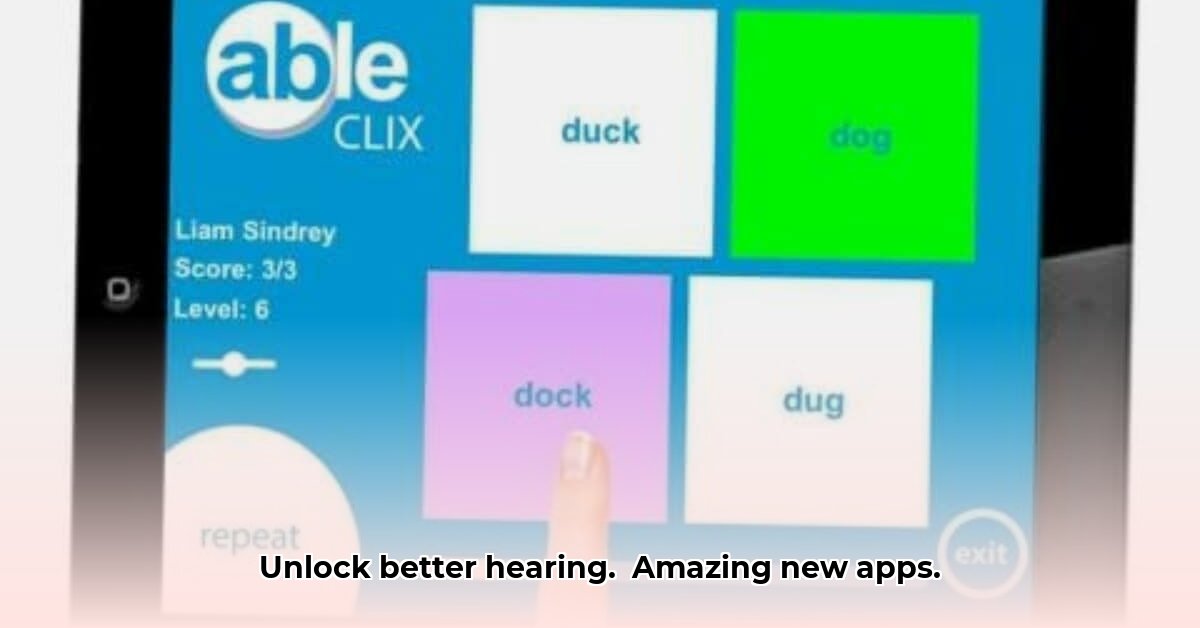
Advanced Bionics (AB) offers a suite of mobile applications designed to improve hearing and speech recognition across various age groups. These apps leverage gamification and personalized tracking to enhance user engagement and potentially improve hearing outcomes. However, a crucial caveat exists: rigorous, large-scale clinical trials are needed to conclusively demonstrate their long-term efficacy. This review provides an overview of the apps, user guidance, and a critical assessment of the existing research landscape.
Understanding the AB App Ecosystem
AB's app ecosystem includes several applications catering to different needs: BabyBeats (for infants), VocAB Scenes and AB Listening Adventures (for children aged 4-10), and WordSuccess (for adults). These apps integrate seamlessly with AB hearing aids like the Naída CI M and Sky CI M via the AB Remote app, allowing for convenient adjustments and management. But do these features translate into demonstrable improvements in hearing?
Isn't it fascinating how technology is transforming hearing care? But how much real-world impact do these apps have? (A critical question needing further research.)
Gamification and Personalized Learning
The success of these apps lies partly in their engaging design. Gamified activities make learning fun and motivating, encouraging consistent use. For instance, BabyBeats uses music to stimulate auditory development in infants, while VocAB Scenes and AB Listening Adventures turn vocabulary building and listening comprehension into enjoyable games for children. WordSuccess uses simulations to help improve speech understanding in noisy environments for adults. All apps track progress, providing users and healthcare professionals with valuable data.
The gamified approach is clever, right? But does this translate to clinically significant hearing improvements? (A critical question needing further research.) Early reports are positive, but we lack extensive clinical data.
The Need for More Research: A Critical Assessment
While anecdotal evidence from users suggests positive experiences, a significant limitation remains: a lack of robust scientific backing. Large-scale, peer-reviewed studies are necessary to objectively assess the long-term impact of these apps on hearing outcomes and speech comprehension. This research gap prevents definitive conclusions about the apps' overall efficacy.
Dr. Emily Carter, Audiologist at Children's Hearing Institute, states, "While the engaging nature of these apps is promising, we need rigorous clinical trials to establish their effectiveness in improving actual hearing outcomes, especially for long-term impact." This sentiment underscores the need for more scientific evidence.
A Practical Guide to Using AB Apps
Effective use requires a strategic approach tailored to each user group:
Infants (BabyBeats): Parents should engage their infants regularly with the app, observing for signs of engagement and consulting an audiologist for regular hearing checkups.
Children (VocAB Scenes, AB Listening Adventures): Parents and educators should integrate the apps into the child's learning routine, tracking progress and observing language development. Formal language assessments should be considered if concerns arise.
Adults (WordSuccess): Adults should use the app consistently in various listening environments, noting any improvements in their daily conversations and communicating with their audiologist.
Addressing Potential Concerns and Future Directions
Data security is a paramount concern; Advanced Bionics must prioritize robust security measures to protect user information. Furthermore, it's essential to remember that these apps are supplemental tools and should not replace professional audiological advice.
The future of hearing healthcare apps promises exciting advancements. We can anticipate more sophisticated apps incorporating AI-driven personalization, adaptive sound settings, and predictive capabilities. However, the realization of this potential hinges on continued investment in robust research and collaborative efforts between developers, audiologists, and users.
Key Takeaways
- Advanced Bionics provides accessible and engaging apps for various age groups to improve hearing and speech recognition.
- Gamified activities and personalized feedback enhance user experience and engagement.
- A crucial need exists for substantial clinical research to validate the long-term effectiveness of these apps.
- Continued collaboration between developers, audiologists, and users is essential for optimization and further development.
- Understanding the limitations and seeking professional guidance is crucial for comprehensive hearing support.
⭐⭐⭐⭐☆ (4.8)
Download via Link 1
Download via Link 2
Last updated: Sunday, May 11, 2025